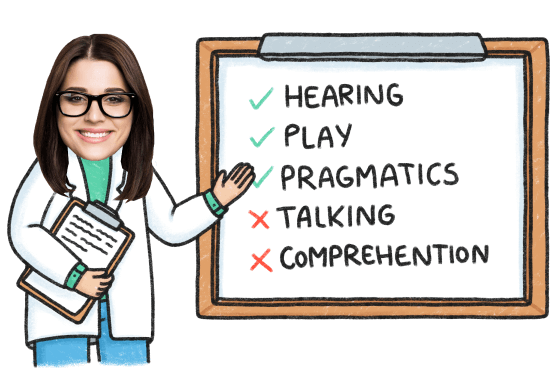Developmental Regression in Toddlers - What Can I Do?
Feb 10, 2022 Have you noticed your child seems to revert to a “baby-like” state? Did your child go from speaking in sentences to babbling again?
As a parent, it is extremely frustrating to see your child stop progressing in their social, physical, speech, and language development. Normally, when a child’s speech and language regresses it is a sign of Autism. While a developmental regression is alarming, there are causes to a regression that are not related to a diagnosis of Autism.
Let’s take a look at common regression situations, causes, and when to seek further evaluation for Autism screening.
What is Developmental Regression?
A developmental regression is a loss of skills your child once had. For toddlers, this means a regression in the areas of potty-training, social, physical, and speech development. Many toddlers go through periods of regression.
However, the regression period is normally short-lived and is not a cause for alarm.
But this does not stop a loving parent like yourself from worrying about your child’s future development.
To help you understand what a developmental regression looks like, here are some common regression examples in toddlers:
- A fully potty-trained toddler may begin having accidents during the daytime again;
- A walking toddler will start crawling around the house;
- A toddler who sleeps through the night now cannot sleep without you next to him;
- A talking toddler now reverts to using nonsense words and babbling;
- A toddler who once was not shy now does not speak around other children;
- Instead of using words, a toddler is now communicating through pointing at things to show their needs and wants.
Do you feel like your child speech is regressing?
Take this free cutting-edge 3-minute quiz. You will find out if your child is on track with his milestones and receive a free personalized report.
Causes of a Regression
A developmental regression is very frustrating. Sure, you don’t want your child to grow up too fast, but you also don’t want them to lose developmental milestones.
When a toddler starts to regress, ask yourself if your child has been going through some major life changes lately. Many causes of a developmental regression are due to life changes or even the development of other milestones.
Here are three common reasons behind a developmental regression:
1. Learning to master a new milestone
Learning a new developmental milestone is the most common cause of a toddler’s regression. Since it is so common, you don’t need to be alarmed if a regression occurs for this reason.
A child is simply focusing on another major life skill.
Ask yourself the following question: What new skill is my child trying to master now?
A child who is learning to use the potty may begin to regress in speech development. For example, your child went from learning new words each day to using nonsense words when he/she started potty-training.
Thankfully, many children will begin to progress again once the new skill is mastered.
2. Encountered a major life change
Developmental regression occurs when a child experiences a major change in life. This cause of regression is more cause for concern because your toddler is experiencing some type of stress or fear related to the major life change.
While life changes need to occur, it can be overwhelming and stressful for children. That stress leads to a fear associated with a new event.
Here are common life changes that cause regression in toddlers:
- Moving into a new home;
- Welcoming a sibling;
- Starting/switching preschool;
- A new caregiver/nanny/babysitter.
These life event changes may not only create stress, but that stress may manifest into anxiety. For a toddler, a simple way to deal with that anxiety is by going back to a “baby-like” state.
As with learning a new milestone, this cause of regression should resolve itself over time. However, it’s important to try and limit the amount of anxiety your toddler feels when it comes to fear and the new life event.

For a toddler, a simple way to deal with that anxiety is by going back to a “baby-like” state.
For instance, if you just introduced a new sibling into the family make sure to spend one-on-one quality time with your toddler to ensure him/her of your love. Try reading together, playing a game, or having a dance party or two. Do whatever is enjoyable for your toddler and shows the love and attention you still have for him/her.
3. Autism Spectrum Disorder
This is seen as the main cause for concern when seeing a developmental regression. Many children develop normally the first year without any typical signs of Autism. But once a toddler reaches 2-years-old, parents begin to recognize signs of Autism in their child.
If the above two causes don’t explain why your toddler suddenly regressed, then the possibility of Autism needs to be examined.
However, signs of regression when related to Autism look differently than a typical regression caused by an event/change or learning a new skill.
In addition, developmental regression in children with Autism is also recognized by the following symptoms:
- Repetitive word use,
- Repeating phrases,
- Trouble communicating with both verbally and nonverbally,
- Speech and language regression,
- Lack of social interest and interaction.
If your toddler is exhibiting any of the above signs related to developmental regression, talk to your child’s pediatrician. It is best to speak up about developmental concerns as early as possible to start receiving intervention services.
What Toddler Regression Looks Like
I first began to have concerns with my son’s development around the age of two. But since he turned 3, he has completely regressed developmentally.
Over the course of six months, my 3-year-old has gone from speaking three to four sentences, asking why questions and learning new words to almost NO communication. He is still speaking, but I cannot understand anything he says!
On top of the speech and language regression, his preschool teacher voiced her concerns to me additionally about being overly sensitive to loud noises, playing by himself, repetitive play, no talking, and not interacting with other children.
He’s only using nonsense words of the same syllables on repeat. Not only is his speech regressing nonverbal cues like pointing at objects is few and far between. For instance, he cannot tell me what he wants and will not point at an object even if I ask him to. This leads to a full-blown meltdown with screaming and crying if I still cannot figure out his needs.
It’s become extremely frustrating! My husband and I are now seeing other signs of Autism that we never noticed before (even though he’s had those signs a while).
On one hand, I am grateful for my toddler’s speech regression because without it I never would have been able to recognize the other signs he’s displaying of Autism. But I am also completely heartbroken!
Not because he might have Autism, but because he’s struggling so much to communicate simple needs and wants.
Now that we recognize the signs of Autism in our son, we are moving forward with occupational and speech therapy appointments to start the evaluation process.

Toddler not saying words he used to
While a developmental regression is frustrating, there’s hope! Most often the cause of regression is simply a life event putting stress and anxiety on a toddler. Another cause can be your toddler is learning to master a new set of important life skills.
But in some cases of regression, there are signs pointing to the possibility of Autism. I know because my own son falls into this category.
Many times, there is a simple reason behind a developmental regression and therefore the regression will get better with time. However, if the developmental regression continues with no signs of getting better and you see other signs of Autism in your child, contact a pediatrician or a speech therapist immediately! Early intervention is necessary to help children and adolescents out of a developmental regression and help them in progressing forward developmentally.
Have a question for our Speech Therapists?



Hello
my baby girl around her 10th and 11th month used to wave goodby and clap hands now she is one year and 2 months old and stopped doing these although am trying to teach that all day every day, is this serious?
Hi Hamida,
I know it can be worrisome when our children are doing a motor skill and then stop. Is your daughter doing anything else? Is she starting to babble more? Is she working on her walking skills? When children are attempting to master a new skill, some of the older skills are put on the back-burner, so to speak. It doesn’t mean they won’t do it again, it just means they are focused on something newer and more exciting. Hope that helps, but if you have any further questions, please reach out to us!
Stacie Bennett, SLP
My son is 2.5 years old and is having regression in speech, loves to play by himself and don’t like to play with other children. Physically he is over energetic. Most of the time he is jumping on sofa. Hitting his younger brother and slapping on my face. There might be one reason that he used to sleep beside her mother but due to his younger brother he has to sleep with me(his father) in other room which he didn’t want and I forcefully compelled him to sleep with me. Might be it hurt him emotionally and disturbed his mental health resulting in developmental regression as for as speech skill is concerned. I want your opinion and also want to know if it is worrisome and can he regain his speech skill development. Or can it be autism or ADHD?
I’m really frustrated with this issue please guide me what to do.
Hi. Anytime that I hear a child is having a speech and language regression, as well as the physical hitting, I would highly suggest that you talk to your child’s pediatrician and get a referral to a speech-language pathologist and neurodevelopmental pediatrician. Typically, a speech regression and the other symptoms that you are mentioning can be a red-flag for Autism; however, it could just be that he is dealing with some emotional issues related to the sleeping, that could be causing him to act out in a negative way. The jumping on the furniture could indicate some hyperactivity, as well. I hope this information helps!
Stacie Bennett, M.S. CCC-SLP
Hi,
I have a 2 year 1 month old son. He used to say dada, mamma, nana some 2 months back. Now he says whole day only. He gives eye contact when we talk to him or sing a rhyme. But he don’t listen when we call his name. What to do?
At two years of age, a child should be saying more than three words. In fact, most two-year-olds can produce simple phrases and short sentences. They might not be clear all of the time, but they make the effort. I would recommend you get an evaluation by a speech-language pathologist to see if there is a communication disorder present.
Stacie Bennett, M.S. CCC-SLP
My daughter was saying Dada and Mamma at 12 months. She knew where her nose was and her mouth. At 15 months we have noticed she no longer says Mamma or Dada and when we play the “where’s your nose game, so big and any developmental exercises she doesn’t respond. She hasn’t advanced to saying any more words yet. My wife and I are a little concerned. She just babbles and cries. We read to her every day and we have picture flash cards.
At 15 months, most children can say 3-5 words (not always clearly), point to one body part and understand a simple direction. Not all children can do these milestones at the same time or at the same level. If your daughter was saying words and now isn’t, I would suggest looking into early intervention services. These services are provided by the state and are usually free. A speech pathologist employed by the agency will come to your home, evaluate your child and see if services are warranted.
I want you to also know that babbling is the precursor to language development. At the end of 14 months, children are undergoing a cognitive leap, which means they are attempting to learn not only communication, but gross and fine motor skills as well. Typically, one skill is put on the back burner, so to speak, while the other areas are worked on.
Some tips you can try are:
1. Get her attention before speaking to her
2. Give her choices; don’t just anticipate her needs
3. Repeat the word three times that you are trying to get her to say
4. Model correct language
5. Narrate your daily routines to her
Stacie Bennett, M.S. CCC-SLP
My daughter is a little over two years old and my husband and I have been reading to her, talking to her. But she hasn’t picked up on any new words. She’s regressed from saying simple words to just babbling or making sounds for the item she wants. She doesn’t point to what she wants but she will take us to where the item is. We’re currently not going through anything major except for my husband working overnight for the past of days. Some days she will just repeat the same word over and over again. Is this any concern for us to consider speech therapy? I had it when I was younger, I talked to her pediatrician and she wasn’t concerned about it.
I would say yes, that you should go to a speech therapist to get an evaluation. It sounds like you are doing all the right things! When she takes you to what she wants, make sure you say the object or item three times to her to expose her to the word. Since there is a family history of speech and language therapy, it’s always a good idea to get her checked out! I’m not sure where you live, but early intervention services are also available for children until the age of three! The therapist will come to your home and assess/work with your child, if you feel comfortable! Once she turns three and if there is still a need for therapy, you can seek out a private therapist!
Stacie Bennett, M.S. CCC-SLP
After weekly ST for 6 mos my 26 mos old with speech regression has made no progress and doesn’t say any words; only squeals. ENT eval was normal. Working dx is regressive autism. So .. in what amount of time would you expect at least a word or two?
Regressive autism is a term that doctors use when a child is progressing normally and then, around 18-30 months, begins to slide backwards in the areas of speech and language. Most parents ask speech-pathologists when their child will begin to communicate and the truth is, we cannot predict that for you. Every child is different and the severity of their disorder, syndrome or delay will dictate when and if language will occur. My tip for you is to continue speech and language therapy for your child. Any activities or suggestions that the therapist provides to you, make sure that you are being consistent and doing them at home as much as you can. I know it’s hard to hear, but hang in there!
Stacie Bennett, M.S. CCC-SLP